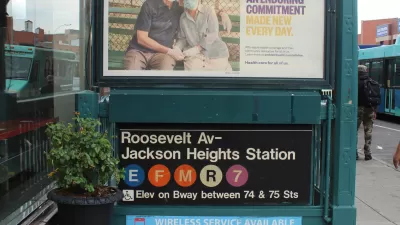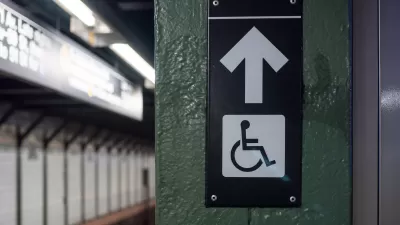Under a new zoning law, New York City developers can receive density bonuses for building elevators and other accessibility upgrades for the city’s subway system.

A New York City zoning amendment allows developers to build at higher density in exchange for including accessibility projects in their plan. As Jacob Kaye reports in the Queens Eagle, a new elevator planned for the Queensboro Plaza subway station will mark the first time the law has been used outside of Manhattan since its passage last year.
The amendment, titled Zoning for Accessibility, takes advantage of new development projects near subway stations to improve accessibility to the city’s subway system. “The accessibility project, which is being constructed on the northern side of Queens Plaza, is part of Grubb Properties development of 25-01 Queens Plaza North. The 26-story residential tower will include a little over 400 units, 30 percent of which would be deemed affordable.” Without Zoning for Accessibility, the building would only be built with 16 stories.
“As part of the deal, Grubb Properties will install the new elevator for access to the station mezzanine level and replace the current subway entrance. The developer will be responsible for maintenance of the staircase on the north side of the station, as well as elevator improvements.”
On the heels of two lawsuits claiming that the Metropolitan Transportation Authority (MTA) violated the Americans with Disabilities Act (ADA), the agency has pledged to make 95 percent of its stations compliant with the ADA by 2055.
FULL STORY: Queensboro Plaza to get accessibility upgrades

Planetizen Federal Action Tracker
A weekly monitor of how Trump’s orders and actions are impacting planners and planning in America.

Maui's Vacation Rental Debate Turns Ugly
Verbal attacks, misinformation campaigns and fistfights plague a high-stakes debate to convert thousands of vacation rentals into long-term housing.

Restaurant Patios Were a Pandemic Win — Why Were They so Hard to Keep?
Social distancing requirements and changes in travel patterns prompted cities to pilot new uses for street and sidewalk space. Then it got complicated.

In California Battle of Housing vs. Environment, Housing Just Won
A new state law significantly limits the power of CEQA, an environmental review law that served as a powerful tool for blocking new development.

Boulder Eliminates Parking Minimums Citywide
Officials estimate the cost of building a single underground parking space at up to $100,000.

Orange County, Florida Adopts Largest US “Sprawl Repair” Code
The ‘Orange Code’ seeks to rectify decades of sprawl-inducing, car-oriented development.
Urban Design for Planners 1: Software Tools
This six-course series explores essential urban design concepts using open source software and equips planners with the tools they need to participate fully in the urban design process.
Planning for Universal Design
Learn the tools for implementing Universal Design in planning regulations.
Heyer Gruel & Associates PA
JM Goldson LLC
Custer County Colorado
City of Camden Redevelopment Agency
City of Astoria
Transportation Research & Education Center (TREC) at Portland State University
Jefferson Parish Government
Camden Redevelopment Agency
City of Claremont





























